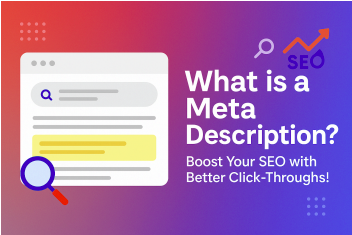
A meta description is a short version of the web page’s content in the search
results beneath the page title. It’s usually a few sentences long and is meant to
give the user an idea of what the page is about and how it is related to their
search. While it is not directly visible on the web page itself, it plays a crucial role
in how web pages are displayed in search engine results pages.
Why meta descriptions are important for SEO
Improves Rankings:
It doesn’t directly affect Google rankings, but it influences how many people click
on your link. More clicks signal to search engines that your page is useful, which
can help improve its ranking over time.
Helping Users:
It gives users a fast review of what your page is about. A clear and attractive
summary can help users decide if your page is what they’re looking for, reducing
the chance that they will quickly leave (bounce rate).
Visibility in Search Results:
Meta descriptions, when displayed by search engines, highlight the search query,
attracting more attention to the link. Optimizing these descriptions to include
primary keywords without keyword stuffing can enhance their effectiveness.
Brand Communication:
It is a chance to showcase your brand’s message. Think of them as a
mini-advertisement for your content, highlighting key points and calls to action.
Control Over Snippets:
If you don’t provide a meta description, search engines might pull random text
from your page, which may not be as effective. Writing your own gives you
control over what potential visitors see.
Conclusion
A meta description is a brief, crucial summary of your web page’s content that
helps improve the user experience and click-through rates, making it an essential
part of SEO. While they don’t directly impact search engine rankings, their role in
driving relevant traffic makes them an essential part of SEO.
